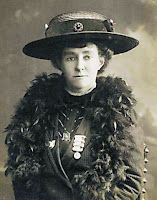When it is not fashionable to mention someone's religious motivation
 The suffragettes are in the news at the moment because of the centenary of Emily Wilding Davison's death when she stepped in front of the King's horse at the Derby. There is room for discussion about the tactics of the suffragettes but it is not my purpose to enter into this discussion here. What interested me was an article at Lapidomedia, : Faith and feminism: Channel 4 accused of blind spot.
The suffragettes are in the news at the moment because of the centenary of Emily Wilding Davison's death when she stepped in front of the King's horse at the Derby. There is room for discussion about the tactics of the suffragettes but it is not my purpose to enter into this discussion here. What interested me was an article at Lapidomedia, : Faith and feminism: Channel 4 accused of blind spot.The point is that the Christian faith was a strong motivating factor for social reformers of the 19th and early 20th century, definitely including Emily Davison and many of the suffragettes. Yet this is rarely examined or even noted in popular documentaries in the media.
When Davison threw stones at a car carrying Lloyd George to a meeting at Newcastle, she wrapped them in paper carrying the message "Rebellion against tyrants is obedience to God." She was an advocate of violent action and, again, we might want to discuss the morality of this. However, she believed strongly that her action was a calling from God.
If Davison had been a fascist agitator, or mass-murderer, there would be no article in any paper, no television programme or radio piece that would not begin by describing her as "Davison, the fundamentalist Christian" or something similar. But she was a suffragette, and she is therefore regarded as a unsullied hero for a cause regarded with unquestioning admiration by all right-thinking people.
And so her Christian motivation is airbrushed out of every story about her in the mainstream media.
H/T Neil Addison of the Religion Law blog

